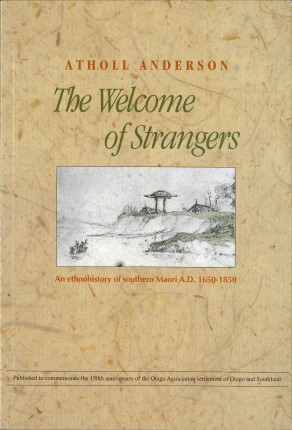
The Welcome of Strangers: An Ethnohistory of Southern Māori 1650-1850 – Athol Anderson (1998)

Two hundred years ago Māori in the south of New Zealand had a lifestyle quite distinct from that of their northern cousins, and different experiences of contact with Europeans. This book provides an insight into those times.
Publication details
Anderson, A. The Welcome of Strangers: An Ethnohistory of Southern Māori 1650–1850. Dunedin: University of Otago Press, 1998.
About the book
The title of this book by Professor Atholl Anderson FRSNZ, The Welcome of Strangers, was taken from Thomas Brunner's 1847 comment ‘At Parika we received the welcome of strangers in a bountiful supply of fern-root, preserved wekas and fish.' The work – a significant one dealing with the history of the origins and migrations of Waitaha and Kati Mamoe, and the arrival of Ngāi Tahu – was commissioned by the Dunedin City Council to commemorate the 150th anniversary of the Otago Association Settlement of Otago and Southland.
Drawing on tribal knowledge as well as early written accounts, the author surveys the origins and migrations of the Waitaha and Kāti Mamoe peoples and the subsequent arrival and establishment of Ngāi Tahu. A vivid picture of southern lifeways is painted, showing how communities were run and how they lived off land and sea using the system of ‘mahinga kai’ in organising food resources. The impact of European arrivals in the form of whalers and sealers and later missionaries is described, as well as Māori responses to their increasing presence.
Further information
This publication is part of the series Te Takarangi: Celebrating Māori publications - a sample list of 150 non-fiction books produced by a partnership between Royal Society Te Apārangi and Ngā Pae o te Māramatanga.
